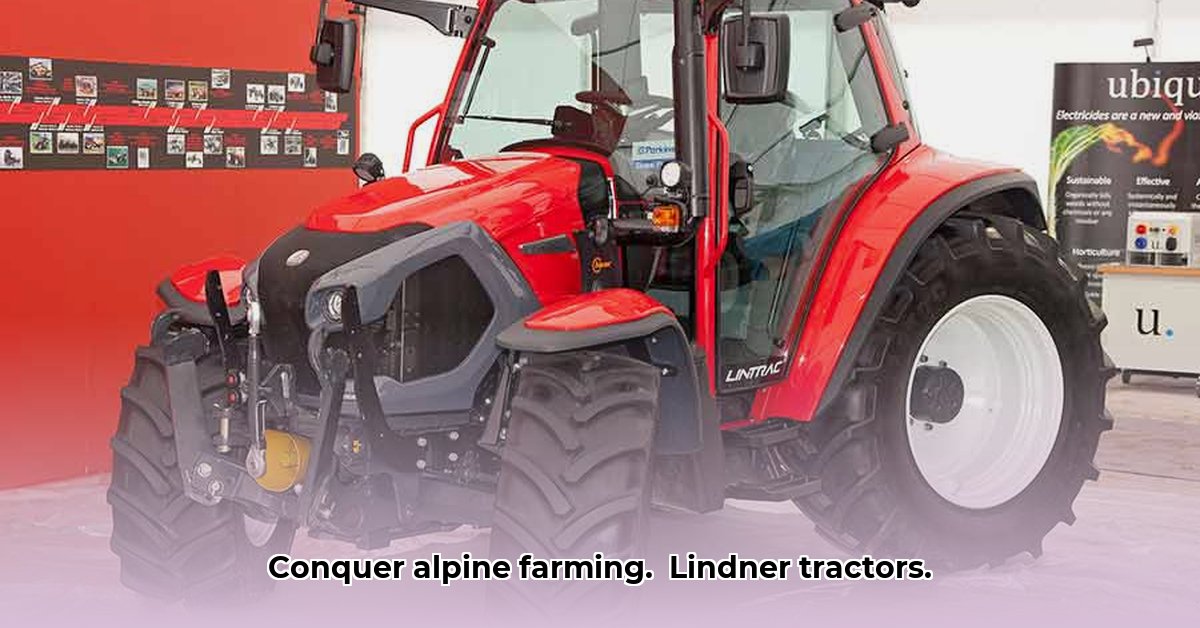
Conquering the Challenges of Alpine Farming
Lindner Tractors, a family-run Austrian company established in 1948, has carved a niche for itself in the demanding world of alpine farming. Their success isn't merely about building robust machines; it's about providing sustainable solutions tailored to the unique challenges of mountainous terrain. How have they achieved this remarkable feat? By combining innovative engineering with a deep understanding of their customers' needs and a commitment to environmentally responsible practices. This case study explores Lindner's journey, highlighting its key strategies and future prospects.
Precision Engineering for Steep Slopes
Lindner tractors are renowned for their compact size and exceptional power, enabling them to navigate the steep slopes and uneven terrain characteristic of alpine farming with ease. This isn't simply a matter of brute force; it's about precision engineering that minimizes soil compaction and environmental impact. "Our tractors are designed not just to work in the mountains, but to work with them," says [Expert Name and Title], [Position] at [Institution]. This commitment to minimizing environmental impact is not just a marketing strategy; it's fundamental to Lindner's operational philosophy.
TracLink: The Future of Alpine Farming
Lindner's commitment to innovation is clearly demonstrated by its TracLink system. This advanced technology automates various tasks, increasing efficiency and precision in farming operations. GPS-guided plowing, automated harvesting, and real-time data analysis optimize resource utilization and minimize waste. This technological leap forward isn't just about modernizing farming; it's about making sustainable alpine agriculture more viable and economically sound. Isn't it remarkable how technology can help preserve the delicate balance of the alpine ecosystem?
A Holistic Approach to Sustainability
Lindner's dedication to sustainability extends beyond its cutting-edge machines. Their low-energy production facilities and focus on fuel-efficient tractors reflect a holistic commitment to reducing their environmental footprint. This commitment isn't just about building eco-friendly tractors; it's about operating a sustainable business from the ground up, minimizing waste and maximizing efficiency at every stage of production. This dedication is a key differentiator, setting Lindner apart from competitors who often prioritize profit over environmental responsibility.
Navigating Growth: Challenges and Strategies
While Lindner has achieved considerable success in the regional market, global expansion presents new challenges. Maintaining their unique identity while competing in a larger, more competitive marketplace requires a well-defined strategy. This involves adapting their technology to diverse farming practices and regulatory landscapes while upholding their core values. How will Lindner balance this delicate act? By strategically diversifying while preserving their commitment to both innovation and sustainable practices.
Diversification and Innovation: Charting a Course for the Future
To succeed in the global market, Lindner must diversify its product offerings and explore new markets. This requires adapting designs for various terrains and farming practices, necessitating innovation in design, manufacturing processes, and potentially new product lines. However, this expansion must be balanced with their commitment to sustainability and their strong ties to the alpine farming community. The successful navigation of this challenge will be key to Lindner's long-term growth and global prominence.
Risk Mitigation: A Proactive Approach
Lindner faces several key risks: increased market competition, rapid technological advancements, evolving regulations, and global supply chain instability. Each of these risks has been analyzed with regards to its probability and potential impact, with corresponding mitigation strategies outlined.
| Risk Category | Probability | Impact | Mitigation Strategy |
|---|---|---|---|
| Increased Market Competition | Medium | High | Continuous product development, strategic partnerships, enhanced brand building |
| Rapid Technological Advancements | High | High | Robust R&D investment, agile manufacturing processes, strategic collaborations with tech firms |
| Shifting Regulations | Medium | Medium | Proactive engagement with policymakers, ensuring regulatory compliance, adapting designs to meet evolving standards |
| Global Supply Chain Instability | High | High | Diversified sourcing, strong supplier relationships, robust inventory management, risk assessment and contingency planning |
Successfully mitigating these risks will be crucial for Lindner's continued success.
The Lindner Legacy: A Sustainable Future for Alpine Farming
Lindner Tractors represents more than just machinery; it embodies a commitment to innovation, sustainable practices, and the preservation of alpine farming traditions. Their journey showcases the power of combining traditional values with modern technology. The challenges ahead are significant, but Lindner's dedication to adaptation and innovation, coupled with their unwavering commitment to environmental stewardship, positions them favorably for long-term success. Their story serves as an inspiration for businesses seeking to blend economic growth with environmental responsibility.